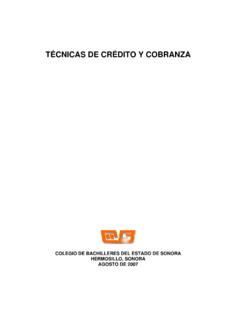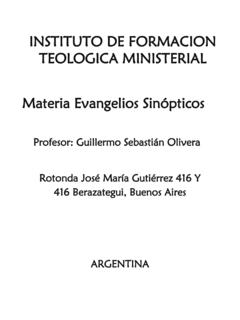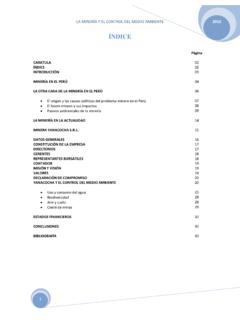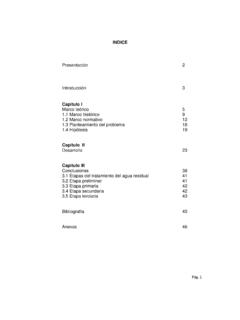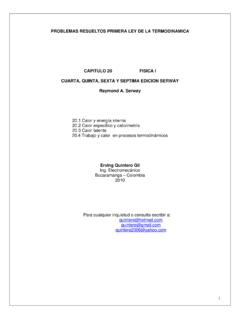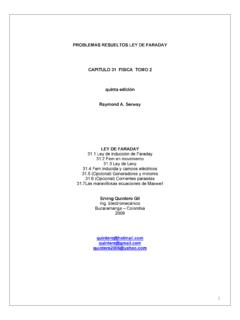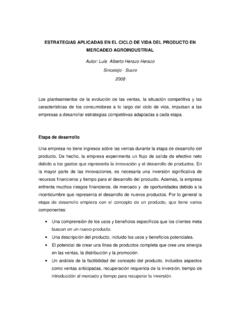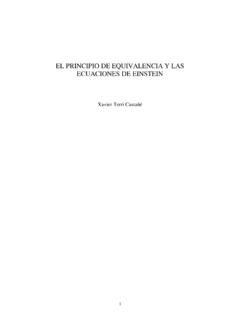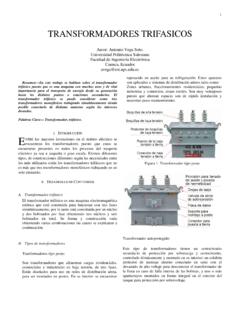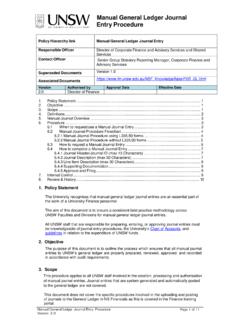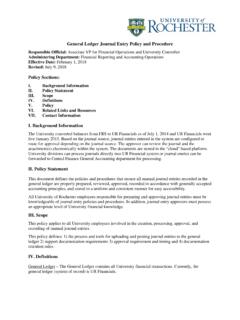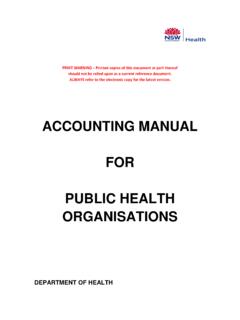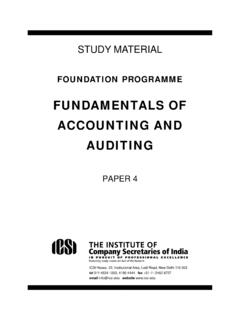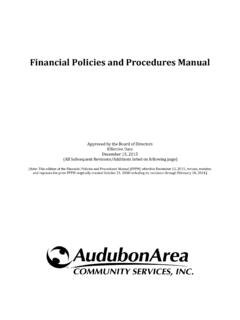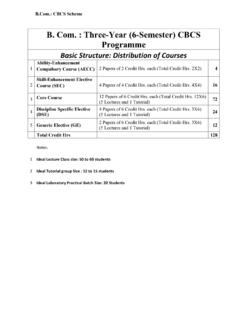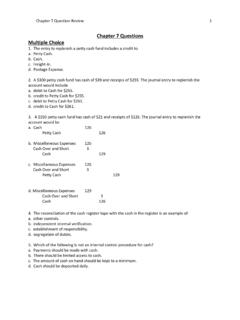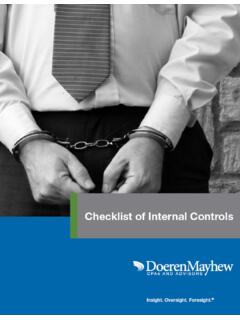Transcription of English for Accountancy Inglés para contabilidad
1 English for Accountancy / Ingl s para contabilidad Luisa Fernanda Lassaque English for Accountancy - Ingl s para contabilidad Autora: Luisa Fernanda Lassaque 1 Lassaque, Luisa Fernanda Ingl s para contabilidad : English for Accountancy - 1a ed. - Buenos Aires : el autor, 2006. E-Book. ISBN 987-05-0447-7 1. Ingl s T cnico Contable-Ense anza. I. T tulo CDD Fecha de catalogaci n: 12/01/2006 Queda hecho el dep sito que marca la ley Luisa Fernanda Lassaque Editora: Luisa Fernanda Lassaque ISBN 987-05-0447-7 Queda prohibida su reproducci n total o parcial, por cualquier medio, sin el consentimiento por escrito de la autora. English for Accountancy - Ingl s para contabilidad Autora: Luisa Fernanda Lassaque 2 1 - T rminos b sicos para contabilidad / Basic accounting terms Una duda frecuente que se plantea es qu diferencia hay entre accounting/ Accountancy y bookkeeping ?
2 Cu ndo se usan unos y otros? Accountancy se nos presenta como un t rmino m s abarcativo que BOOKKEEPING ; mientras que BOOKKEEPING implica solamente la tenedur a de libros, es decir, transcribir en forma de asientos las operaciones diarias de una empresa (ventas que se reflejan en facturas emitidas, compras que se reflejan en salidas de dinero de caja y en la existencia de facturas que justifican esas compras), la palabra Accountancy sugiere una tarea mucho m s amplia y abarcativa, cual es la de analizar e interpretar los datos financieros y econ micos asentados en libros por parte del tenedor de libros, para luego poder exponer un balance, valuar activos, confeccionar una certificaci n, etc. mediante la aplicaci n de principios y normas contables. La definici n de Accountancy , tomada de un diccionario de origen estadounidense, es: British term referring to the activities and theories comprising accounting including practice, research and teaching.
3 It includes the guidelines, principles, and procedures accountants are to follow in conducting their tasks. Accountants have legal and ethical responsibilities to their clients and public . Otra de las diferencias que se aprecian a partir de la definici n precedente es que un BOOKKEEPER no tiene la misma responsabilidad que un ACCOUNTANT . En este segundo caso, existe una responsabilidad profesional de reflejar fielmente el estado de situaci n de un individuo o una empresa, contablemente hablando, bajo pena de ser penalizado con la exoneraci n de su matr cula profesional. En el caso del BOOKKEEPER , o del BOOKKEEPING , tal responsabilidad se encuentra minimizada, dado que la funci n natural del tenedor de libros es la mera realizaci n de una tarea manual, la registraci n en el sistema de partida doble (que no conlleva una responsabilidad profesional equivalente a la del contador), que ser luego parte integrante de los procedimientos y normas de que se vale un contador para llegar a formular, como ltimo paso del ciclo contable, los estados contables de la empresa.
4 La palabra Accountancy nos refiere a la ciencia contable y a la posibilidad de analizar y procesar informaci n; en consecuencia, a la posibilidad de generar nuevo conocimiento a trav s de ellas, mientras que la palabra BOOKKEEPING nos refiere a la t cnica contable, una serie de pasos que se aplican repetitivamente sin grandes posibilidades de introducir variantes. Como tercer t rmino, tenemos a ACCOUNTING . ACCOUNTING nos remite al proceso contable, es decir, a la registraci n, selecci n, interpretaci n y exposici n de la informaci n contable para ser brindada a terceros interesados en ella. El t rmino ACCOUNTING tambi n nos habla de los m ltiples aspectos que tienen relaci n con la registraci n contable de la actividad comercial: el aspecto impositivo de un proceso contable, el aspecto referido a control, o auditor a, el an lisis del comportamiento financiero de dicha actividad comercial, entre otros.
5 La definici n en ingl s de ACCOUNTING es la siguiente: English for Accountancy - Ingl s para contabilidad Autora: Luisa Fernanda Lassaque 3 1) umbrella term encompassing the multitude of disciplines including auditing, taxation, financial statement analysis, and managerial accounting. Accounting-related functions include financial accounting, cost accounting, not-for-profit accounting, and financial planning. 2) process of recording, measuring, interpreting, and communicating financial data. The accountant prepares financial statements to reflect financial condition and operating performance. Also, the accounting practitioner renders personal accounting services to clients such as preparing personal financial statements and tax planning. 2 - More about the distinction between bookkeeping and accounting There is some confusion over the difference between bookkeeping and accounting.
6 This is partly due to the fact that the two are related. Bookkeeping is the recording of business data in a prescribed manner. A bookkeeper may be responsible for keeping all of the records of a business or of only a small segment, such as a portion of the customer accounts in a department store. Much of the work of the bookkeeper is clerical in nature and is increasingly being handled by mechanical and electronic equipment. Accounting is primarily concerned with the design of the system of records, the preparation of reports based on the recorded data, and the interpretation of the reports. Accountants often direct and review the work of bookkeepers. The larger the firm, the greater is the number of levels of responsibility and authority. The work of accountants at the beginning levels may possibly include some bookkeeping. In any event, the accountant must have a much higher level of knowledge, conceptual understanding, and analytical skill than is required of the bookkeeper.
7 3 Grupos de afinidad con accounting / Collocations with the word accounting Todos los giros que se enumeran a continuaci n designan algo que tiene que ver con lo contable (control contable, ciclo contable, ecuaci n contable, entre otros), y todos ellos tienen antepuesta la palabra accounting debido a su funci n adjetiva (en lugar de Accountancy ). ACCOUNTING CHANGE: cambio/modificaci n contable. En ingl s a change in: 1) accounting principles (such as a new depreciation method); 2) accounting estimates . ACCOUNTING CONTROL: control contable, mediante procedimientos que garantizan la correcci n de la tarea de registraci n. En ingl s: procedures used to assure accuracy in the record keeping function. Controls exist to make certain source data placed in the system are proper and correct . English for Accountancy - Ingl s para contabilidad Autora: Luisa Fernanda Lassaque 4 ACCOUNTING CONVENTION: convenci n contable, en forma de m todos o procedimientos.
8 En ingl s: methods or procedures employed generally by accounting practitioners. They are based on custom and are subject to change as new developments arise . ACCOUNTING CYCLE: ciclo contable. En ingl s: series of steps in recording an accounting event from the time a transaction occurs to its reflection in the financial statements; also called bookkeeping cycle. The order of the steps in the accounting cycle are: 1) transactions are analyzed; 2) transactions are journalized and posted to the ledger ; 3) trial balance is prepared; 4) data needed to adjust the accounts are assembled; 5) work sheet is prepared; 6) financial statements are prepared; 7) adjusting entries are journalized and posted to the ledger ; 8) closing entries are journalized and posted to the ledger ; 9) post-closing trial balance is prepared . ACCOUNTING ENTITY: entidad/unidad contable. En ingl s: business or other economic unit (including subdivisions) being accounted for separately.
9 A system of accounts is kept for the entity. An accounting entity is isolated so that recording and reporting for it are possible. Examples of accounting entities are corporations, partnerships, trusts, and industry segments . ACCOUNTING EQUATION: ecuaci n contable. En ingl s: double entry bookkeeping where there is an identity of debit and credit elements of a transaction. For each transaction, the total debits equal the total credits. For example, the payment of $ 100 to a creditor requires a debit to accounts payable and a credit to cash for $ 100. The accounting equation can also be expressed as: Assets = Liabilities + Capital An increase (or decrease) in total assets is accompanied by an equal increase (or decrease) in liabilities and capital . ACCOUNTING ERROR: error contable. En ingl s: inaccurate measurement or representation of an accounting-related item not caused by intentional fraud.
10 An error may be due to negligence or may result from the misapplication of generally accepted accounting principles (GAAP). Errors may take the form of dollar discrepancies or may be compliance errors in employing accounting policies and procedures. Erros can be minimized by diligently following accounting procedures and standards, and maintaining proper internal control . ACCOUNTING EVENT: transacci n/operaci n. En ingl s transaction entered in the accounting records of a business. It can be an external transaction -that is, one with an outsider, such as recording a sale. It can also refer to an internal transaction, such as making an adjusting entry ( , expense or revenue accrual) . ACCOUNTING MANUAL: manual contable/manual de contabilidad . En ingl s: handbook containing policy guidelines, procedures, and standards for accounts of a company or an individual.
